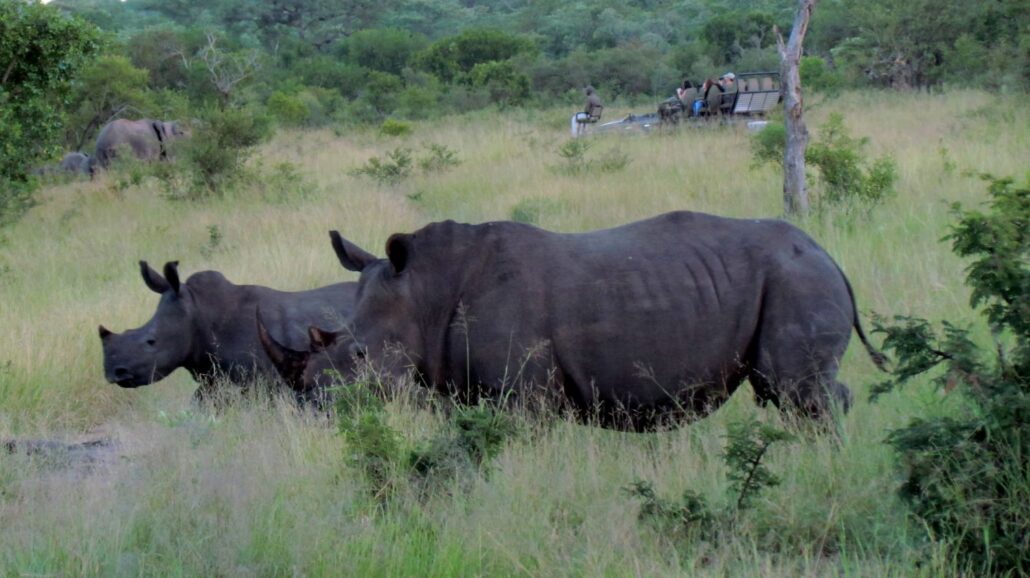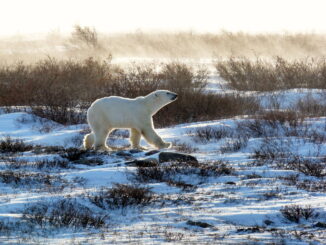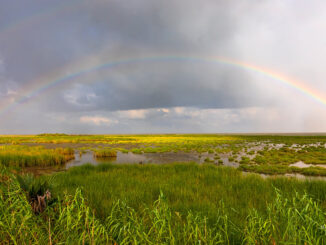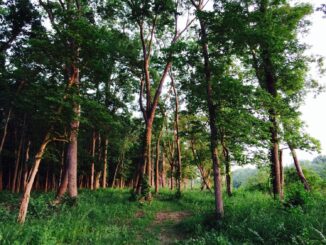
Populations of rhinoceroses in South Africa are still falling because illegal poaching activity is as high as it’s ever been, two researchers are now warning.
Their controversial findings fly in the face of what South African authorities have been saying since 2017.
Law enforcement authorities charged with protecting rhinos at Kruger National Park in South Africa insist that their anti-poaching efforts are working. They say their statistics show that incidents of illegal rhino killings at Kruger, long home to one of the world’s largest rhino populations, have been sharply falling since 2017.
But two wildlife researchers writing in the journal Science Advances say the South African government’s assessment is incorrect. Rhino poaching is in decline, say Jasper Eikelboom and Herbert Prins of Wageningen University, because poachers are running out of rhinos to kill.
“There are not fewer poachers, but fewer rhinos to poach,” the pair wrote in their new groundbreaking paper.
Kruger National Park managers say reported poaching incidents and poaching arrests are on a downward trend. They cite such figures as evidence that efforts to combat the illegal trafficking of rhino horns are working.
Eikelboom and Prins paint a different picture.
In their new paper, they present data showing “a plummeting trend of the rhino population coinciding with the decline in poaching numbers.”
They say their research indicates that poachers invading Kruger National Park to attack endangered rhinos are spending more time wandering the park in search of the animals.
As is the case with the park rangers, poachers and rhino horn traffickers don’t know exactly where they can encounter rhinos at the massive park at any given time.
As the rhinos’ numbers fall and there are fewer and fewer of them in Kruger, the rhinos are becoming more difficult to encounter. The research pair said poachers may spend up to three days or more wandering the park before encountering rhinos.
They say the poaching pressure threatening the rhinos’ existence essentially hasn’t let up since 2013. The number of white rhinos in Kruger National Park was calculated to be just under 10,000 individuals in 2015. The park was calculated to be home to less than 2,500 white rhinos by 2022.
“Our results demonstrate that the decline in poached rhinos in Kruger NP cannot be attributed to a reduced poaching pressure, but rather to a constant poaching pressure with dwindling resources,” Eikelboom and Prins conclude.
They acknowledge the sharp decline in the number of rhino poaching arrests since 2017 that the South African authorities reported. However, this new research study argues that arrests are down because poachers are achieving less success due to the dwindling rhino population at the park.
The depressing findings imply that anti-poaching efforts are failing to save South Africa’s rhinos from rhino horn traffickers. The even rarer black rhino faces a graver threat. The black rhino population at Kruger is only a small fraction of the size of the white rhino population, but black rhino numbers are also in decline at the park.
The researchers argue that a better conservation strategy might be to concentrate the surviving rhino population into a smaller area where they can be observed more closely and protected. But even these conservation measures would have to be coupled with a concerted effort to reduce black market demand for rhino horns, especially in East Asian nations like China and Vietnam where rising consumer spending power is fueling the destruction of rhinos.
Most of all, the two wildlife scientists argue that the authorities in South Africa need to wake up and face the grim reality.
“We urge the authorities to cease considering the decline in absolute poaching incidents as a positive sign,” Eikelboom and Prins say. “This poaching pressure is not likely to decrease in the near future because of the high price that consumers are willing to pay for rare animal products, which can drive the species to global extinction.”
©2025 Public Parks
Park Info
Park:
Kruger National Park
Location:
South Africa
More Information:



